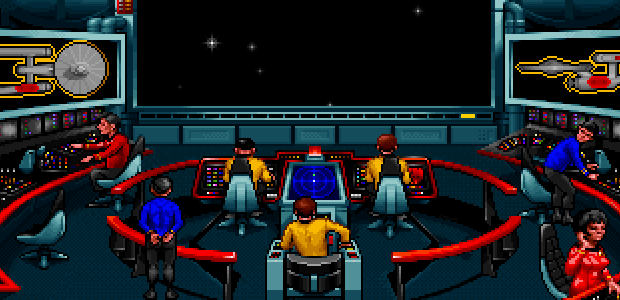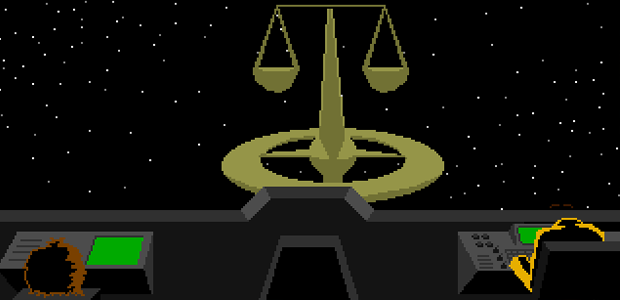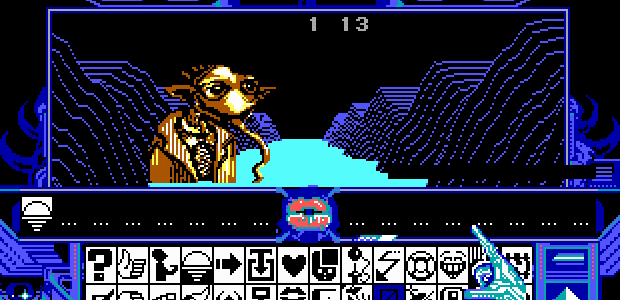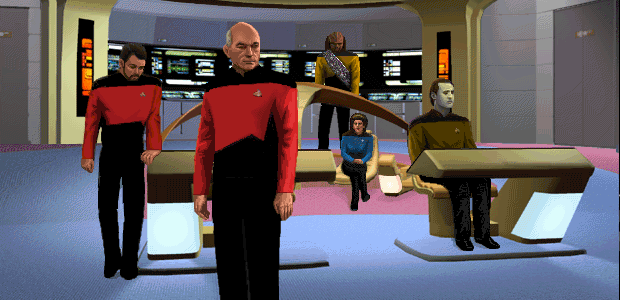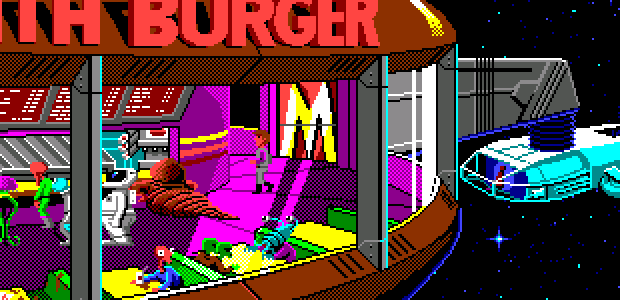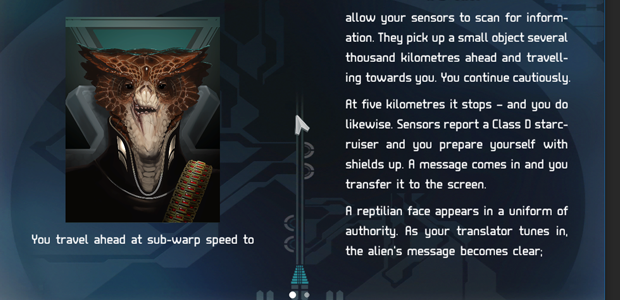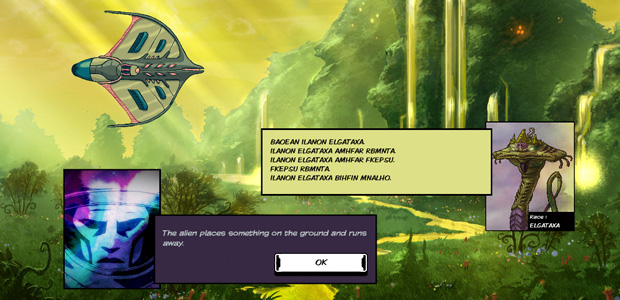The RPG Scrollbars: Adventures In Spaaaaaaace!
My F***ing Sky
Today, a little bit of heresy. I'm going to talk about adventure games. Specifically, about a thing I've always loved in them, when they offer the chance - that sense of being given a ship and a universe to explore. I get a shiver when I look at the star-map. I feel proud of my usually low-resolution, 256-colour VGA vessel. And yet, jump genres to something like RPG or strategy and the moment is just gone. Why does No Man's Sky, a game that actually supports that wanderlust, not give me anything close to the same thrill that something like Space Quest V still does, even knowing that Space Quest V is a) limited to a handful of worlds, each only a few screens in size, and b) makes your cool ship a garbage scow full of people who pretty much hate you?
I don't know, but I love this screen. This, more than any Galaxy Map, is a screen that whispers "You can go anywhere. Do anything. The universe is yours..."
It's a feel that I've always wanted to get from space RPGs, but which seldom actually happens. (Oh, do I have my fingers crossed for Mass Effect: Andromeda) That doesn't mean I've not loved many of them, from Mass Effect to Captain Blood to Martian Dreams back in the day. Space is awesome. It's just all too often Not The Same, and I think a lot of it comes down to how the various genres see it. To a game like Elite, having a ship is nothing special. Everyone has a ship. In an RPG, the ship is typically a collection of stats and crew first, a ship second. In an adventure though, there's time to acknowledge what an awesome thing it would be. That feeling of taking control for the first time. Crew with personality. The knowledge that there isn't just a universe out there, but a universe that's been designed first and foremost for exploration, and hand-crafted to reward it with adventure and exploits rather than just maybe seeing something cool or finding a new way to earn some form of in-game spacebucks.
In short, yes, it's the wrapping. But it's wrapping rooted in drama and power and confidence that most other genres tend to drop the ball on. Dramatic music as the engines fire up. The whoosh of going to warp or hyperspace or whatever else gets folks from A to B. The knowledge that adventure awaits, but could be anything, from a deep space McDonalds to a deadly fembot on a license to kill. CRPGs tend to be more restrained because they're not really in the mood for complex stories at every point of call. Either what's on the other side is fairly generic, like a planet map, or it's a quick storylet type encounter like FTL or Stellaris, or oddly commonly, it's just known space and nobody on board is all that excited. To use Mass Effect as an example, most of the locations are homeworlds or colonies and the like and space travel is no big deal to any of the crew. In most of the best adventures that offer this kick - I'm thinking of things like Star Trek: 25th Anniversary, Space Quest, hell, even Adventures In The Galaxy Of Fantabulous Wonderment, there's at least one character whose job is to be all "Holy shit! SPACE!" and set the tone for just how awesome it would be to be there.
I'm obviously not saying other genres can't do this. Hell, I'd hope that any Star Citizen player who's bought into its whole ship ecosystem would be shivering like a naked mole rat in the Arctic at the sight of their ship in front of them and the stars above. I can name a couple of games in other genres that did it pretty well. I-War 2 for instance, where you start out as a kid desperately trying to scrape together money in a pirate filled galaxy. The original X, which handled the Farscape vibe better than any other game up to that point, where the sense of being lost in an alien galaxy was one of both terror and opportunity. (Cough, also hopefully see The Long Journey Home, cough, disclaimer: I'm the writer, cough). I haven't played Artemis Bridge Simulator or the new Star Trek take on the same idea, but I'll take on faith that those too offer some degree of it.
But again, for the whole kit and kaboodle, it's adventures that set the tone that I keep going back to. Star Trek: 25th Anniversary for instance treats every mission as if it was an episode of the show, from the opening credits to the banter on the bridge at the end. There's a bit of space combat, but most of the action takes place where space adventures should take place - on planets. In Star Trek Online meanwhile, it's very obvious that all the development love (and certainly the player favour) went on the ship-to-ship combat elements instead. I remember being gutted to find this out, partly because I'd had high hopes for it, but mostly because I was really hoping that it'd offer a system that could be combined with user-generated content to actually fill the galaxy with awesome content to discover instead of simply choose from a menu - an MMO that could be played as a search for story and new content. Needless to say, that never ended up happening. Not even after the user generated content tools finally showed up.
The reason of course that RPGs can't typically do as well as adventures is... well, ironically, it's space! One reason that adventure games do this kind of exploration so well is that historically, part of the artform was creating the illusion of a far bigger world than the player actually got. A big game would be around 60 rooms, but many managed to pull off the illusion of scale with far fewer. This for instance is Leisure Suit Larry 2, which crammed in Los Angeles, a cruise ship, two different islands, and its title screens into really not that many backgrounds. A big part of the trickery was making it convincing that you were only seeing a tiny slice of the world outside, which could be anything. Put the player in a space ship and it's not that hard to limit access to locations while still pretending that they're there. Space Quest III for instance focused on locations within travel distance, which just happened to be about three planets and a Monolith Burger. Space Quest V provided a huge starmap which served as copy protection, with the implicit message that you could go to all these places, but you simply don't have time. But oh, if you could, what wonders you might see!
With RPGs, we expect to be able to go everywhere. Or at least, damn near everywhere within the provided space. On land it doesn't really matter if it's somewhere as small as Morrowind or as wide as Temeria. Given a sector of space to play in though - uh-oh. That's a loooooooooooot of space that someone has to fill up. In the early days of games like Buck Rogers, you weren't going to get the disk space for that. Now, the expectations of such content are so high that the only real option is to go the other way and provide lots of nothing. A few empty planets and bases for something like Mass Effect's Mako are about all you can expect to find if you go off-book for a while, not just because it would be too hard to fill the space, but that anything it could be filled with would seem slight and incidental next to all the movie-style AAA flash taking place on the actual story path. Top marks of course to those games that did manage to pull something else out of those limitations, including Starflight, Star Control 2, and now I think about it, the CYOA book Starship Traveller.
What's interesting about right now though is pondering a few recent games that have dared to take on the size of space and try to fill it. FTL set things up quite well with its constant Encounters. No Man's Sky at least attempts to jazz up its mostly empty worlds with unexpected plot bits and pieces, though for my taste the galactic heartbeat of those discoveries was stronger in its obvious inspiration, Out There. And as said, Stellaris is something of a dark horse, especially with news like former-Failbetterer Alexis Kennedy joining up to write some of its story chunks. Stellaris didn't do all that much for me as a 4X game, but I really dug it as more of a Star Trek-style exploration system where I'd keep stumbling into interesting things while failing to conquer the place and researching completely the wrong thing. It's not hard to imagine an RPG that borrows the glorious wrappings of adventure games past, while using simple text and graphics and even mod support to populate a universe with a universe of content.
I hope so, anyway. Because the problem with the adventure games that have pulled off the trick of making the universe feel like a huge, thriving place full of possibilities is that it is, ultimately, exactly that. A trick. A feint. Bullshit, if you will. And no matter how well they've always pulled off it, at least part of the lingering excitement at the warp drive starting up and the crew exchanging a few sarcastic words about the mission ahead, is that sense that one day, the RPGs of the world would be able to pull off what they pretend for real. Perhaps now that space is finally cool again and the indie scene has shown that anything can be accepted with the right presentation, it's finally time to break down that barrier and explore some of those penultimate frontiers.
Just as long as there's something to actually do on the other side.


